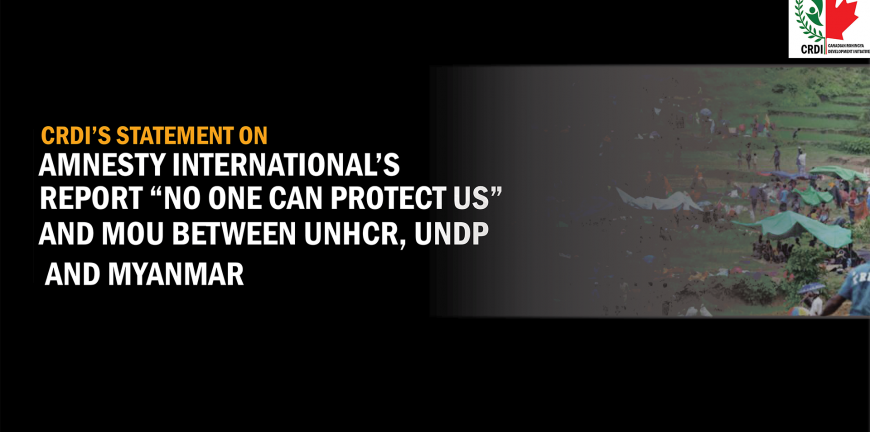CRDI’s Statement on AI’s Report
ASIA-UPDATES ON MYANMAR ROHINGYA GENOCIDE, 3 Jun 2019
Canadian Rohingya Development Initiative – TRANSCEND Media Service
Amnesty International’s latest report, “No one can protect us” is an evidence-based, persuasive detailing of the most recent military violence in Rakhine state against ethnic Rakhine and Rohingya.
30 May 2019 – Amnesty International just released a hard-hitting report on the continued violations of international humanitarian law and human rights abuses in Rakhine state. Since the beginning of 2019, violence perpetrated principally by the Myanmar military against mostly ethnic Rakhine and some Rohingya in Rakhine state has escalated. The Arakan Army (one of the country’s armed insurgent groups, made up of ethnic Rakhine) has become the target of the Myanmar military, as they seek more autonomy from the Burmese state.
Systemic Nature of Military Abuse – Connection to 2017 Violence against Rohingya
The report outlines that the military units who (in large part) orchestrated the genocide and exodus of Rohingya people into Bangladesh in August 2017 are the same units conducting latest military operations against the ethnic Rakhine, occasionally Rohingya, and other minorities.
Using multiple sources of data and information, this report frankly explains the indisputable role of the military in these crimes: “the new operations in Rakhine State show an unrepentant, unreformed and unaccountable military terrorizing civilians and committing widespread violations as a deliberate tactic…The prospect of meaningful justice and accountability in Myanmar is almost non-existent, as criminal responsibility goes to the military’s senior-most levels…The fact that violations – including war crimes – have been committed not only by units long based in Rakhine State and associated with previous atrocities but also by newly-deployed units, highlights the institutionalized and systemic nature of military abuse in Myanmar.”
Effects of Violence on Rohingya Communities
As this report indicates, Rohingya continue to be victims of conflict in Rakhine state. It underlines how the Burmese military continuously shows indifference toward civilian life due to their excessive use of heavy artillery, aerial bombardments, and landmines that disproportionally affect civilians. As well as being direct causalities to the violence, Rohingya further have trouble accessing urgent medical aid for those who are injured and sick. And, the report recounts instances of forced labour by Rohingya civilians, and the military use of their schools. Moreover, the report highlights that there are still approximately 128,000 people, most of them Rohingya, who are internally displaced, lacking access to basic necessities.
Abuses by Arakan Army against Rohingya
The report goes on to explain how Rohingya continue to be targets of military violence, by both the Burmese military as well as the Arakan Army. The report clarifies that “while the overwhelming majority of violations have been perpetrated by the Myanmar military, the Arakan Army has also committed abuses, including abductions and arbitrary deprivation of liberty. Almost a month after they were abducted by AA fighters in Rathedaung Township, the fate and whereabouts of two ethnic Rohingya men remain unknown. In some instances, AA fighters have conducted operations in a manner that has placed civilian villagers at risk of harm.”
Memorandum of Understanding
At the same time, in the midst of this heightened level of violence, the United Nations High Commissioner for Refugees (UNHCR), the United Nations Development Programme (UNDP) and Myanmar’s Ministry of Labor, Immigration and Population) have extended the memorandum of understanding (MoU) they had drafted in spring 2018, for another year. The ostensible goal of the MoU is to create conducive conditions for voluntary and sustainable repatriation of Rohingya from Bangladesh, by establishing a framework of cooperation for improved and resilient livelihoods for the communities in northern Rakhine state. The parties reaffirmed their stated commitment to the timely and effective implementation of this goal.
We at CRDI find this reaffirmation and one-year extension disturbing for three important reasons:
- First, in light of Amnesty International’s report, there is clear and damning evidence of increased violence in Rakhine state perpetrated by the military, and in no such conditions should repatriation occur;
- Second, a continued lack of consultations with those who are impacted by the MoU – most notably, the Rohingya people living in Bangladesh, as well as the wider diaspora who aspires to one day move home is troubling;
- Third, if we were to return, there is no guarantee that our rights will be fulfilled.
How can discussions of repatriation of essentially our entire community occur without our consent and without our voice in the matter? Repatriation without consultation and repatriation without a guarantee of citizenship and all accompanying rights is categorically inhumane.
We have not seen any evidence that Myanmar has improved the conditions in Rakhine (in fact, as we irrefutably can see, they have worsened) to make us think that a repatriation is a realistic option. It is hard to believe that these three parties have our security and survival in mind when crafting such statements when the risk of violence and death in Rakhine is highly likely.
We urge the UNHCR and the UNDP to listen to our perspectives and to incorporate our wishes in the decision-making processes that impact our lives and the lives of our families.
For more information:
Yuriko Cowper-Smith – yuriko@rohingya.ca
Saifullah Muhammad – 1 519-588-7747
Tags: Activism, Asia, Burma/Myanmar, Conflict, Genocide, Geopolitics, Human Rights, Humanitarianism, Indigenous Rights, Justice, Racism, Religion, Rohingya, Solutions, UN, Violence, Violent conflict
DISCLAIMER: The statements, views and opinions expressed in pieces republished here are solely those of the authors and do not necessarily represent those of TMS. In accordance with title 17 U.S.C. section 107, this material is distributed without profit to those who have expressed a prior interest in receiving the included information for research and educational purposes. TMS has no affiliation whatsoever with the originator of this article nor is TMS endorsed or sponsored by the originator. “GO TO ORIGINAL” links are provided as a convenience to our readers and allow for verification of authenticity. However, as originating pages are often updated by their originating host sites, the versions posted may not match the versions our readers view when clicking the “GO TO ORIGINAL” links. This site contains copyrighted material the use of which has not always been specifically authorized by the copyright owner. We are making such material available in our efforts to advance understanding of environmental, political, human rights, economic, democracy, scientific, and social justice issues, etc. We believe this constitutes a ‘fair use’ of any such copyrighted material as provided for in section 107 of the US Copyright Law. In accordance with Title 17 U.S.C. Section 107, the material on this site is distributed without profit to those who have expressed a prior interest in receiving the included information for research and educational purposes. For more information go to: http://www.law.cornell.edu/uscode/17/107.shtml. If you wish to use copyrighted material from this site for purposes of your own that go beyond ‘fair use’, you must obtain permission from the copyright owner.
Read more
Click here to go to the current weekly digest or pick another article:
ASIA-UPDATES ON MYANMAR ROHINGYA GENOCIDE:

